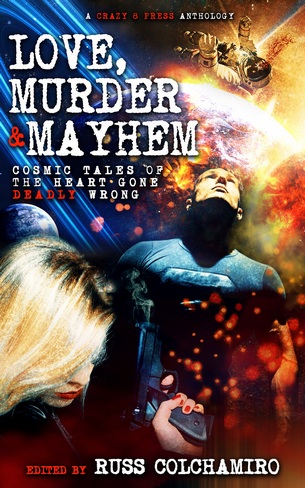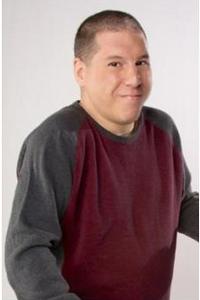This is the longest, and strangest, “Book Tour” I’ve done — it’s actually three separate events, but it’s all been promoting the book, Love, Murder & Mayhem. There was the book blurb and review for the original tour stop, then a Book Blitz post, and now we get to ask a the editor, Russ Colchamiro a few questions. Sure, it’s been irregular, but I’ve enjoyed it. If for no other reason, than I get to keep talking about this really fun anthology.
Anyway, on with the questions…
| I really enjoyed Love, Murder & Mayhem, best anthology I’ve read in quite a while. What was the genesis for this project — particularly the theme. How did you recruit this collection of contributors? |
|
Thanks! Glad you had so much fun with it. I appreciate that.
While writing Genius de Milo, the second book in my Finders Keepers scifi backpacking comedy series, I introduced—briefly—the character of Angela Hardwicke. Though her portion takes place in the fictional setting of Eternity, she’s a private eye in that classic Sam Spade tradition. I bumped up her role considerably for the third and final book, Astropalooza, and knew that I wanted to spend a lot more time with her, with plans to write a spin-off series, which I’m actually working on now. But before I jumped into a full book, I wanted to write a short story with Hardwicke in the lead, to get a better sense of who she was, her rhythms, and the kinds of stories I wanted to tell.
So I started the Love, Murder & Mayhem anthology through my publishing group—Crazy 8 Press. Including the other six core Crazy 8 members, I reached out to other writer friends to contribute, with every story containing at least one act of love or romance, at least one murder, and lots of mayhem. I initially thought I’d get nothing but private stories—I did a get a few—but the anthology contains superhero and supervillain stories, off-world and space cruiser stories, as well as A.I., private eyes, sleep surrogates, time travel, an aliens/monsters mash-up and … one DuckBob!
My story is “The Case of My Old New Life and the One I Never Knew,” where Hardwicke investigates a case of arson in a rock n club she visited the night before to see her favorite band. It was a lot of fun to write. |
|
| If Hardwicke ever gets herself a novel, I’ll be first in line to read it! That’s great to hear.
I know there’s a bunch of information about Finders Keepers on your website to lure in readers — and it’s worked for me, I should add. But other than that, how would you best entice someone to give the series a shot?
|
|
Finders Keepers is one of those books that readers either seem to love or want nothing to do with it! LOL! But if you like to have fun … it’s loosely based on a series of backpacking trips I took through Europe and New Zealand and is centered on a quest for a jar that contains the Universe’s DNA. If you like Douglas Adams, Christopher Moore, Third Rock from the Sun, Harold & Kumar go to White Castle, Groundhog Day, Hot Tub Time Machine, and Bill & Ted’s Excellent Adventure, it might be up your alley.
You can also check out this book trailer – http://russcolchamiro.com/books/finders-keepers/animated-trailer/ |
|
| What is it about the Science Fiction that brings you back — or for that matter, what brought you to it in the first place? Is there a genre you particularly enjoy, but don’t think you could write? |
|
Science fiction allows me to dream as big as I want. Nothing is off limits. Once you open up your worlds like that, your stories can go in directions that other genres simply can’t sustain. And it’s fun! As for other genres, I like a good political thriller now and then, but I’m not the guy to write one. I’ll definitely be writing more crime fiction, but I don’t have the bandwidth—or the desire—to get into geopolitical conspiracies. I’ll let other talented writers handle those! |
|
| What’s the one (or two) book/movie/show in the last 5 years that made you say, “I wish I’d written that.”? |
|
Ready Player One is a great book which I loved. I never could have written it—there’s so much detail in there with all of that great 80s nerd pop culture—but I’d be more than happy had it been mine! Breaking Bad for TV. Great show and the kind of writing and character arcs that are more my style. I’m leaning more in that direction anyway these days. |
|
| I’ve often heard that writers (or artists in general) will forget hundreds of positive reviews but always remember the negative — what’s the worst thing that someone’s said about one of your books, and has it altered your approach to future books? |
|
LOL! I say up front that Finders Keepers is a bit raunchy (Genius de Milo and Astropalooza much less so), but I warn readers up front so that they know what they’re getting. In the middle of all the backpacking and cosmic lunacy, the characters—good natured but bumbling—are drinking beer, smoking some weed, having sex, and dropping some F bombs here and there. And yet I’ll still get a reader now and then who will say something like “The author says it’s a raunchy book, which I hate, but the premise sounded so cool that I read it anyway. I hated it! There’s sex and language and drinking and drugs and college humor. Why did he ruin it?”
Ugh. It’s like someone saying they hate horror, gore, and violence, watching The Chainsaw Massacre despite knowing the plot, and then complaining about the horror, gore, and violence! LOL! Eh. But what can you do? I don’t worry too much about it.
Between this series, Love, Murder & Mayhem, the various anthologies I’ve contributed to, and my space adventure Crossline, there’s plenty of options for readers to choose from.  |
|
| I want to thank Russ Colchamiro for taking time for this.
I was asked to add the promotional info about the book and editor to this, and sure, it’s been here already, but, hey — if this helps the book get some more eyeballs, why not? |

About the Book:
Love science fiction stories that all include elements of Love, Murder & Mayhem?
Then welcome to the latest anthology from Crazy 8 Press! This amazing collection from 15 all-star authors will delight you with superheros and supervillains. AIs, off-worlders, and space cruisers. We’ve also got private eyes, sleep surrogates, time travelers, aliens and monsters—and one DuckBob!
With tales ranging from wild and wacky to dark and gritty to heartbreaking and fun, take the deadly leap with authors Meriah Crawford, Paige Daniels, Peter David, Mary Fan, Michael Jan Friedman, Robert Greenberger, Glenn Hauman Paul Kupperberg, Karissa Laurel, Kelly Meding, Aaron Rosenberg, Hildy Silverman, Lois Spangler, Patrick Thomas, and editor Russ Colchamiro.
You’ll never look at Love, Murder & Mayhem the same way again—and that’s just the way we like it.
About the Editor:
Russ Colchamiro is the author of the rollicking space adventure, Crossline, the hilarious sci-fi backpacking comedy series,  Finders Keepers, Genius de Milo, and Astropalooza, and is editor of the new anthology, Love, Murder & Mayhem, all with Crazy 8 Press.
Finders Keepers, Genius de Milo, and Astropalooza, and is editor of the new anthology, Love, Murder & Mayhem, all with Crazy 8 Press.
Russ lives in New Jersey with his wife, two children, and crazy dog, Simon, who may in fact be an alien himself. Russ has also contributed to several other anthologies, including Tales of the Crimson Keep, Pangaea, and Altered States of the Union, and TV Gods 2. He is now at work on a top-secret project, and a Finders Keepers spin-off.
As a matter of full disclosure, readers should not be surprised if Russ spontaneously teleports in a blast of white light followed by screaming fluorescent color and the feeling of being sucked through a tornado. It’s just how he gets around — windier than the bus, for sure, but much quicker.
Website * Facebook * Twitter * Instagram





